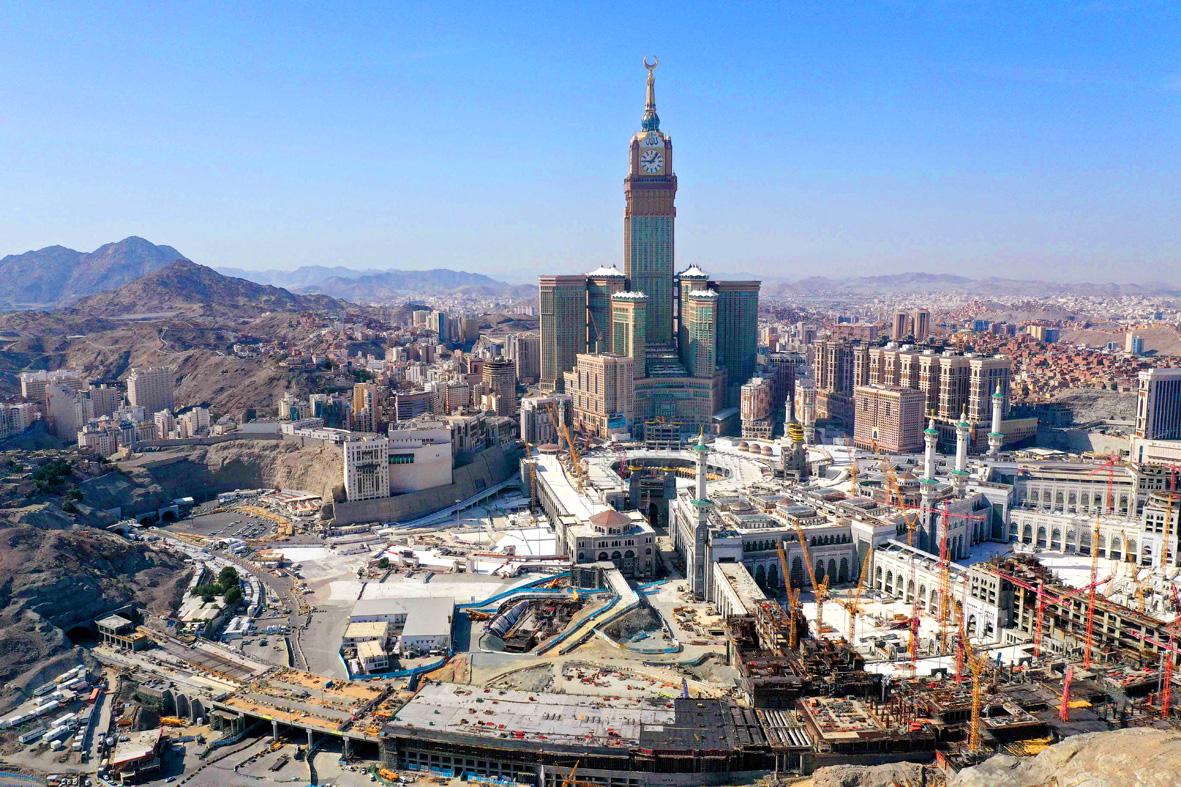Saudi Arabian authorities are racing to contain an outbreak of COVID-19 in the Islamic holy city of Mecca, where crowded slums and labor camps have accelerated the spread even with much of the nation under a 24-hour curfew.
The total number of coronavirus cases reported in Mecca, home to 2 million people, reached 1,050 on Monday compared with 1,422 in the capital of Riyadh, a city more than three times the size.
Mecca’s large number of undocumented immigrants and cramped housing for migrant workers have made it more difficult to slow the infection rate.

Photo: AFP
Late last month, after five Mecca-based employees of Saudi Binladin Group, one of the kingdom’s biggest construction companies tested positive, authorities locked down housing for 8,000 laborers and suspended work on the expansion of the grand mosque, Islam’s holiest site, according to a document seen by Bloomberg.
Some workers were placed in hotel quarantine, the document showed. The company did not respond to a request for comment. It was unclear if the camp remained in lockdown.
Shielding Mecca from a pandemic that has overwhelmed countries like Italy and the US is crucial for Saudi Arabia. That is partly because of the city’s significance to the world’s Muslims, but also because the royal family grounds its rule in guardianship of the birthplace of Islam. Millions of Muslim pilgrims visit Mecca each year; King Salman’s official title is “custodian of the two holy mosques.”
The government is conscious that the virus sweeping Mecca would “call into question its responsibility in the protection of those spaces, which is part of the legitimacy of the country itself,” said Yasmine Farouk, a visiting fellow in the Middle East Program at the Carnegie Endowment for International Peace. “This is sensitive.”
Overall, Saudi Arabia has reported one of the lowest rates of infection in the region, with about 5,000 cases in a population of more than 30 million.
Mecca was one of the first Saudi cities to be placed under a full-day curfew, and authorities took unprecedented precautions, suspending religious tourism in February and closing mosques across the nation last month.
The outbreak underlines a nationwide issue of soaring cases among foreign residents.
Foreigners make up about a third of the Saudi Arabian population, but account for 70 percent to 80 percent of new cases recently, according to the Ministry of Health — a rate that has sparked debate about their role in society.
Some Saudi Arabian have attacked foreigners, accusing them of price-gouging, fear-mongering and deliberately spreading infection. Others say that the solution lies in better living conditions for the blue collar foreigners who underpin daily life, driving garbage trucks and cleaning streets.
Saudi Arabian novelist Mohammed Alwan recently wrote on Twitter that he hoped authorities would create “humane requirements for workers’ housing” after the pandemic.
Saudi Arabian Minister of Health Tawfiq al-Rabiah acknowledged the problem in a televised address on Monday, saying a government committee had been formed to deal with the issue.
The government has also promised free coronavirus treatment for foreign residents, including undocumented immigrants.

BACKLASH: The National Party quit its decades-long partnership with the Liberal Party after their election loss to center-left Labor, which won a historic third term Australia’s National Party has split from its conservative coalition partner of more than 60 years, the Liberal Party, citing policy differences over renewable energy and after a resounding loss at a national election this month. “Its time to have a break,” Nationals leader David Littleproud told reporters yesterday. The split shows the pressure on Australia’s conservative parties after Prime Minister Anthony Albanese’s center-left Labor party won a historic second term in the May 3 election, powered by a voter backlash against US President Donald Trump’s policies. Under the long-standing partnership in state and federal politics, the Liberal and National coalition had shared power

NO EXCUSES: Marcos said his administration was acting on voters’ demands, but an academic said the move was emotionally motivated after a poor midterm showing Philippine President Ferdinand Marcos Jr yesterday sought the resignation of all his Cabinet secretaries, in a move seen as an attempt to reset the political agenda and assert his authority over the second half of his single six-year term. The order came after the president’s allies failed to win a majority of Senate seats contested in the 12 polls on Monday last week, leaving Marcos facing a divided political and legislative landscape that could thwart his attempts to have an ally succeed him in 2028. “He’s talking to the people, trying to salvage whatever political capital he has left. I think it’s

CONTROVERSY: During the performance of Israel’s entrant Yuval Raphael’s song ‘New Day Will Rise,’ loud whistles were heard and two people tried to get on stage Austria’s JJ yesterday won the Eurovision Song Contest, with his operatic song Wasted Love triumphing at the world’s biggest live music television event. After votes from national juries around Europe and viewers from across the continent and beyond, JJ gave Austria its first victory since bearded drag performer Conchita Wurst’s 2014 triumph. After the nail-biting drama as the votes were revealed running into yesterday morning, Austria finished with 436 points, ahead of Israel — whose participation drew protests — on 357 and Estonia on 356. “Thank you to you, Europe, for making my dreams come true,” 24-year-old countertenor JJ, whose

Polish presidential candidates offered different visions of Poland and its relations with Ukraine in a televised debate ahead of next week’s run-off, which remains on a knife-edge. During a head-to-head debate lasting two hours, centrist Warsaw Mayor Rafal Trzaskowski, from Polish Prime Minister Donald Tusk’s governing pro-European coalition, faced the Eurosceptic historian Karol Nawrocki, backed by the right-wing populist Law and Justice party (PiS). The two candidates, who qualified for the second round after coming in the top two places in the first vote on Sunday last week, clashed over Poland’s relations with Ukraine, EU policy and the track records of their